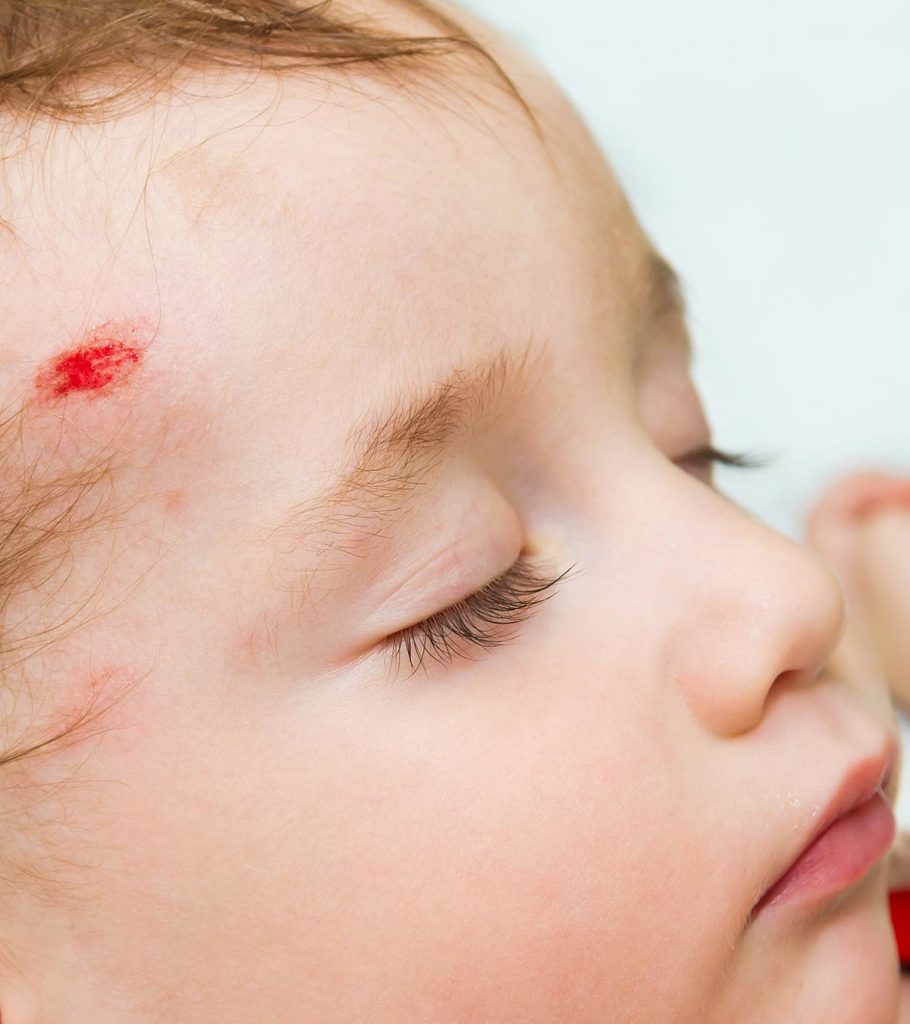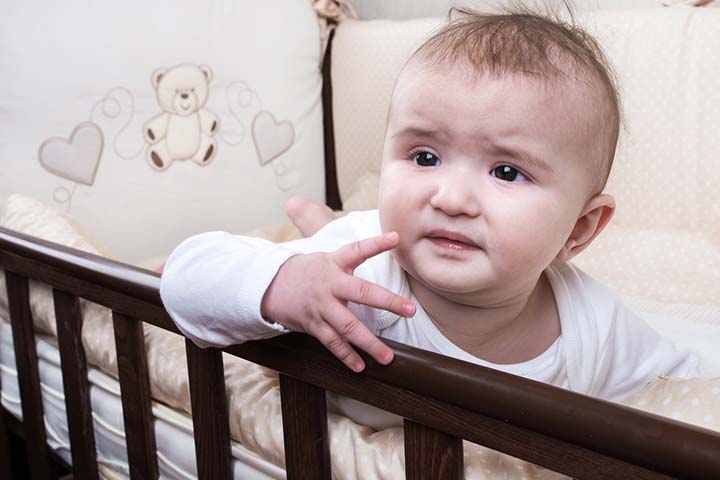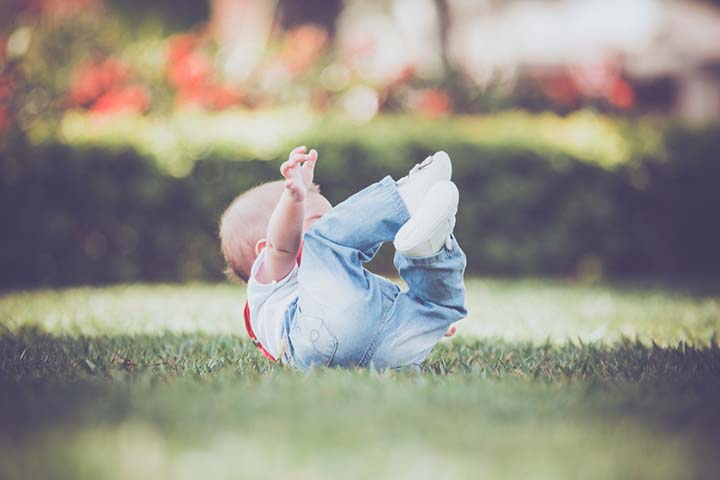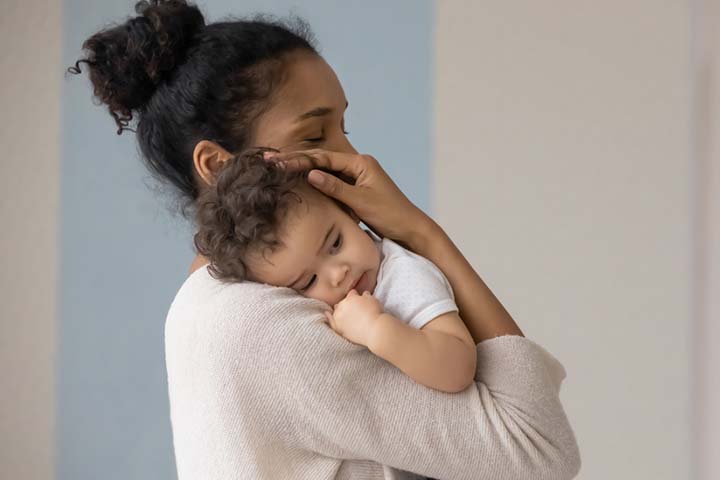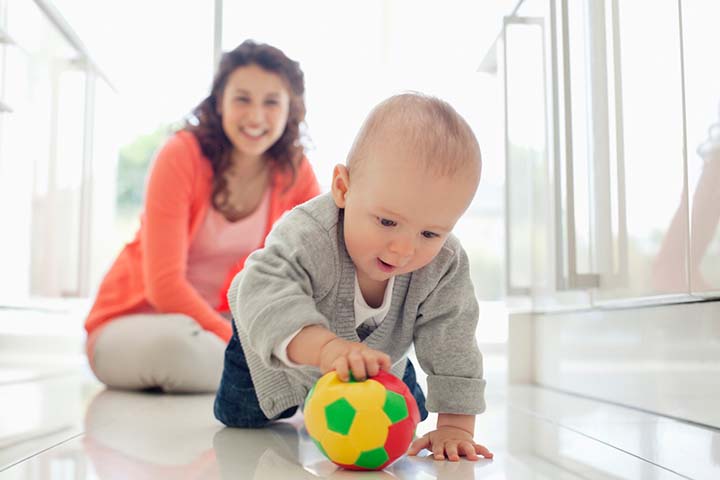A concussion in babies is a head injury that may affect their brain functioning. Before a baby arrives, most parents take all the necessary precautions to ensure their little one’s safety, such as baby-proofing their homes. However, despite all their efforts, their babies may suffer minor injuries. Though minor injuries cause short-term pains and often resolve over time, concussions could affect their growth and developmental outcomes.
Altogether, one must follow the important safety measures, such as keeping the floor dry and devoid of things that could make a baby fall. This could help control falls and head injuries in babies and prevent the consequences of an infant concussion.
In this post, we discuss the causes, complications, and other important details of concussions in babies and some tips to avoid them.
What Is A Concussion?
According to the American Academy of Pediatrics, a concussion is a head injury caused by a sudden jolt or blow that could disrupt normal brain functioning (1). This condition is mostly benign, with the impact on brain function typically being temporary.
But in some cases, a concussion or infant head injury might disrupt normal brain activity and make the baby unconscious. The Harvard Medical School grades concussion on three scales of severity described below (2):
- Grade 1: The least severe form of concussion, when the individual’s brain functions return to normalcy after 15 minutes.
- Grade 2: When the brain malfunctions and the person is confused for more than 15 minutes.
- Grade 3: When the impact is so severe that the person becomes unconscious.
As a concussion may be severe, you need to be alert and look out for the signs of concussion in a baby.
A National Health Interview Survey (NHIS) report evaluated the percentage of children who had ever had symptoms of a concussion or brain injury in different age groups. As the graph below depicts, 6.8% of children showed signs and symptoms of brain injury, of which 2% were children under five. Also, the incidence of these injuries appears to increase with age.
Prevalence of concussion or brain injury symptoms in US children by age
Source: Erectile dysfunction: Frequently asked questions; NHS
Signs And Symptoms Of Concussion In Babies
A concussion is a type of closed head injury in infants, in which the brain might get affected, but without any prominent marks on the skull (3). Thus, the signs of traumatic brain injury in infants are subtle, and parents may find it difficult to understand if the baby has had a concussion.
Symptoms may not show immediately after the injury (4). However, you could look out for these:
- Loss of consciousness: The baby could become unconscious or slip into semi-consciousness due to the injury to the neurons, affecting normal brain function.
- Dizziness or body balance issues: Babies might lose balance while walking or crawling, indicating poor coordination in body movements.
- Dazed, confused, and slurred speech: The baby is unable to understand instructions and seems unresponsive. Older infants, who can talk will have trouble forming sentences and may not speak clearly.
- Abrupt loss of interest: The baby does not enjoy the toys, games, and activities, and tends to stay calm and silent most of the time.
- Crying excessively: A concussion could be like a dull pain, making the baby cry, irritable, and cranky.
- Vomiting and nausea: The baby is unable to digest anything and throws up whatever they are fed. Toddlers and older babies may complain about feeling sick in the stomach.
- Sudden change in daily routine: There is a sudden change in eating, sleeping, and diaper soiling patterns.
- Bleeding or fluid oozing from nose or ears: Blood from nose or ears indicates damaged blood vessels. If the baby does not have a cold but has a clear fluid dripping from the nose, then it could be the cerebrospinal fluidiXA clear, watery fluid that flows in the empty spaces around the brain and spinal cord., which is leaking through the skull and out through the nose.
- Seizures: It includes fits, convulsionsiXRapid and involuntary muscle contractions that lead to rapid and rhythmic shaking of the body, especially limbs., and episodes of loud crying with violent body movement.
- Stiffness or droopiness: The baby’s body seems stiff or droopy. The limbs could appear to be fixed or moving around involuntarily.
Some of the above signs and symptoms are seen immediately due to the concussion. The others that either persist or arise later are referred to as post-concussion syndromeiXA condition where a person experiences dizziness, headaches, or issues with concentration and memory after a trauma to the brain..
You must also keep an eye out for other probable signs such as a wound or bump on the head. An infant may also touch a part of the head repeatedly, especially while crying, indicating pain in that part.
Prompt pediatric consultation is advised for a head or brain injury in newborns to avoid complications.
What Causes A Concussion In Babies?
A variety of reasons can lead to concussions or acquired brain injury in children, as they have rudimentary reflexes and cannot protect themselves.
- Having a fall: Babies falling from the bed, having tripped on an object, or falling while hopping or running, could hurt themselves and cry loudly. If the child is older, they would call out a parent. In such a case, check for bruises or lacerations as they may suggest a pediatric concussion. Babies can also fall from other high platforms like a small chair or sofa and hurt themselves.
A study by UNICEF found that falling from ground level accounted for 8% of fatal falls (5). The risk can increase substantially when an older infant tries to run, hop, or jump over an obstacle.
Julia, a mom of four talks about an incident when she thought that her son might have had a concussion. She recalls, “ I know we had a guardian angel with us at that moment because somehow Truman fell out (of the rocker chair) and remained on the landing instead of rolling all the way down the rest of the stairs, and since the whole carrier fell out of my hand he didn’t free fall from my waist but instead tipped out of the entire seat onto his little forehead.” It was following this moment that Julia thought that her son might have a fall-induced concussion (i).
- When an object falls on the head: A baby could playfully yank the wire of a table lamp, or an older infant could shake a big object, making it fall on their head.
- Baby hits the head to an object: Babies can hit their head to an object while crawling or walking. For example, older infants who crawl at a faster pace may not notice objects in front of them or walk head-first into something.
- Vehicle accident: Babies are at a greater risk of head injuries in car crashes because their heads are larger in proportion to their bodies (6). They can also sustain a concussion due to a fall from a two-wheeler or when riding a tricycle or bicycle.
As you may have noticed, simple, everyday activities can be a cause for concussion in babies. The American Academy of Pediatrics recommends, as a safety measure, that you take your baby to a doctor if there is any injury to the head and to check for post-concussion syndrome in babies.
How Is Concussion In Babies Diagnosed?
Only a medical practitioner can make a conclusive diagnosis and tell if the baby has a concussion or an intracranial hemorrhage. Here is how the condition diagnosed:
1. Check for the physical signs
- The doctor checks for external signs of brain trauma such as a bruise, wound, or swelling on the head. Further checks would be made to find any swelling in the fontanelles, the soft membranous tissue that connects the skull bones of an infant.
- Injured blood vessels rupture internally and bleed, which is seen on the skin as a blue-black patch (bruises).
- In severe concussions, the baby may develop blue or black skin discolorations around the eyes or behind the ears.
- An unbalanced dilation of the pupils may occur, where one eye is permanently dilated while the other is normal. Both eyes may stay dilated with wide-open pupils that do not respond to light. The doctor would check for such dilations and abnormalities.
2. Basic medical tests
- A concussion can cause a malfunction in motor skills, and a doctor tests these skills to determine the damage.
- In the case of suspected malfunctioning, the doctor could conduct basic tests to discern if the baby’s vision and hearing are affected. For this, the doctor would check the movement of the baby’s head in response to a sound or baby’s ability to spot a moving object in peripheral vision.
- In the case of older infants, the doctor would ask the infant to touch the nose, throw a ball, walk in a straight line, or something similar.
3. Imaging tests
- If the test results are inconclusive or the symptoms of concussion are severe, then the doctor would conduct imaging tests to assess the skull.
- An x-ray may be the first choice since it is quick in identifying a skull fracture.
- Scans such as CT and MRI can be conducted in more severe cases as they provide a three-dimensional image of the baby’s skull.
Once the doctor confirms the concussion, the treatment begins immediately.
How Is Concussion In Babies Treated?
The treatment of concussion will depend on the extent of the injury. The treatment could include:
- Rest: Rest is the most important treatment since it is non-invasive, baby-safe, and also ideal for a non-open wound condition, such as a concussion (7). The doctor would advise you to keep the baby away from vigorous physical activities involving cognitive skills as the brain needs rest.
- Topical ointment: If the baby has a bruise or small wound at the point of impact, then the doctor could prescribe a topical ointment primarily to prevent infection and alleviate the pain.
Some home remedies for pain, such as an ice pack might help the infant feel better, but do not force it if the baby is not comfortable with the cold sensation.
What Are The Long-Term Effects Of Concussion In Infants?
Concussions heal over time and do not usually cause any serious health problems or brain damage in infants. However, it is wise to get a concussion checked by a medical professional to know the extent of the damage. Severe head injuries could lead to:
- Loss of developmental milestones: If the injury alters the brain motor skills, the baby might lose out on some achieved milestones. An infant may reach a milestone, only to forget it in a few days. You may notice a complete regression in skills and abilities.
- Permanent problems while feeding or sleeping: The baby is unable to sleep or eat properly and has a changed regime. In severe cases of trauma, the infant may develop insomnia, which is an inability to fall asleep (8).
- Vertigo: Vertigo is the dizzy feeling that occurs in bouts or is triggered by a random stimulus. The condition can persist forever, returning in intervals of days or weeks. Vertigo caused by a concussion is referred to as posttraumatic vertigoiXA condition where a person experiences dizziness and other symptoms of vertigo after a severe or blunt injury to the head or neck. (9).
- Pause in head circumference growth: Some cases of severe concussion could pause the growth in the baby’s head circumference for a few weeks (10). The head growth resumes weeks later, but head growth could lag in comparison to the rest of the body.
- Poor concentration and cognitive disability: Older infants may have trouble picking up new words. They might also lose concentration, even during activities they like. If the problem persists, then it may cause severe cognitive impairmentiXA condition where a person experiences a decline in mental abilities like remembering, learning, concentrating, and decision-making.and intellectual disabilities.
Most concussions do not cause any long-term effects. However, you can minimize the risk of both short and long-term problems by preventing concussions.
How To Prevent Concussions In Babies?
You can mitigate the risk of concussions or mild traumatic brain injury in infants by keeping your baby safe at home. Here are a few precautions you can take (11):
- Baby-proof your house: Tie the wires high above and remove elevated objects that can cause injury when they fall over the head. Cover all the sharp edges of furniture and remove items such as a carpet or doormat that the baby could trip on.
- Never leave an infant unattended: Babies tend to be fidgety and love to hold and move things, but it must be under adult supervision. Older infants should also play under adult supervision, especially while playing with things such as a football or swing and slides.
- Get a crib for the baby: Babies must sleep in cribs that are specifically designed for their age. Do not let your baby sleep alone on regular beds, as babies tend to roll off the edges.
- Get baby car seat: Buy an infant safety harness for your baby when traveling in a car, even for short distances. Choose safety harnesses certified by reputable agencies or organizations. Choose a five-point harness over a three-point one. A five-point harness straps the infant to the seat at five points and has two shoulder points, two hip points, and one between the legs. The three-point harness leaves out the two hip points. Babies should be latched facing the rear of the car as it prevents a sharp shock to the neck and head in case of a forward collision.
A baby concussion is a brain injury that can be assessed on three severity scales. While most concussions are grade 1 or 2, if your infant sustains a grade 3 injury, it may impact their brain functioning as well as their growth and development. Blood from the nose or ears, excessive crying, vomiting, dizziness, and other symptoms may develop. Thus, if the baby has recently suffered a head injury, it is advisable to have them inspected by a doctor. Moreover, taking simple precautions such as baby-proofing the house, using a baby car seat, and a crib could effectively prevent concussions in babies.
Key Pointers
- Incidents such as a rapid shock or blow, falling, or striking the head on anything can result in concussions in infants.
- Common symptoms of a concussion in infants include vomiting, dizziness, seizures, and bleeding from the nose or ears, even if there are no external indications.
- It is important to closely watch infants for concussion symptoms and seek prompt treatment from a pediatrician to avoid brain-related complications.
- Parents can help prevent concussions in infants by baby-proofing their homes, using baby cribs, and car seats.
Learn about the signs and symptoms of concussions in children. Understand what to look for and how to help.
